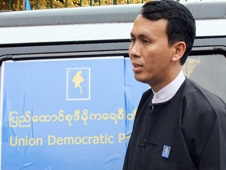Phyo Min Thein sent a letter to party colleagues on 5 August 2010 announcing his resignation and lamenting the fact that increasingly repressive election laws were being rolled out by the Burmese government.
Election result not fair
He told the Democratic Voice of Burma that “we tried our best within the capacity of the Union Democracy Party” but that little more could b e done unless the wider circumstances change. There is “no chance the elections and its results will be free and fair”, he added.
e done unless the wider circumstances change. There is “no chance the elections and its results will be free and fair”, he added.
“The regulations are extremely strict. I don’t plan to continue under circumstances where we can only follow [the government’s] plan,” he said. “This is why I am stopping. I have decided to quit from my position as the chairman and my responsibilities as well as my involvement in this political environment.”
Smaller parties without chances
He added that the Union Solidarity and Development Party (USDP) led by Burma’s prime minister, Thein Sein, was blocking the chances of smaller parties.
The USDP is widely tipped to win the elections, and has a number of current government ministers within its ranks.
Rumours are circulating that Burma’s forestry minister, Thein Aung, will stand in the elections as a candidate in Irrawaddy division’s Ingapu. It is not clear which party he will join, but it is the USDP that appears to be accomodating most government ministers, including foreign minister Nyan Win.
Not the time to withdraw
Thein Tin Aung, general secretary of the UDP, said however that the party will continue to the end despite Phyo Min Thein’s resignation.
“We are not arguing that the restrictions [Phyo Min Thein] mentioned are not true – those facts are correct. But this is not the time to decide to withdraw from the elections,” said Thein Tin Aung. “We will keep on striving for free and fair elections and to represent the people until the voters are given freedom of choice and the right to vote freely.”
voters are given freedom of choice and the right to vote freely.”
He added however that the party will try to survive to restrictive laws, but if it transpired that “people cannot cast votes freely, then we might also have to withdraw from the elections”.
Earlier this year Burma’s main opposition party, the National League for Democracy (NLD), withdrew form the elections.
Political prisoner
Phyo Min Thein spent 15 years in prison after his arrest in 1990. He had been active in the 1988 uprising and was appointed secretary of the All Burma Federation of Student Unions (ABFSU) the in lower-Burma regions in 1990, before being sent to prison.
The UDP was founded earlier this year and quickly became one of the more vocal parties campaigning for Burma’s first elections in two decades later this year.
Out of the 49 parties that have registered for elections, 40 have so far been approved by the Election Commission.
Elections with a pre-determined outcome
The National Democratic Institute (NDI) released on 1 August 2010 analysis in which upcoming elections and new election laws and constitution are analysed.
According to analysis, the process surrounding national elections in Burma, expected later this year, “is clearly designed to guarantee a  pre-determined outcome and, therefore, does not meet even the very minimum of international standards.”
pre-determined outcome and, therefore, does not meet even the very minimum of international standards.”
“The upcoming elections,” NDI said, “appear to be designed to gain international acceptance for an illegitimate process.”
The analysis also includes recommendations for international community how to influence Burma’s authorities and support Burma’s democracy activists.
Please find out the NDI’s analysis here.
Here you can read more about elections, new election laws and constitution in Burma.
HRH Oslo, based on the Democratic Voice of Burma article and the National Democratic Institute’s press release.
Related links:
Burma: 2010 elections may bring no change
Burma: 2010 elections will define the political landscape for years to come
Burma urged to end repression of ethnic minorities before elections





